


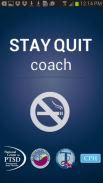
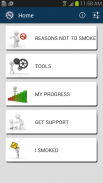

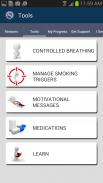

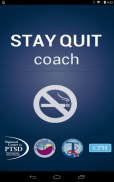


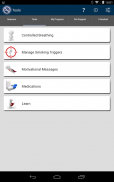

Stay Quit Coach

Описание Stay Quit Coach
Stay Quit Coach is designed to help with quitting smoking. It is intended to serve as a source of readily available support and information for adults who are already in treatment to quit smoking - to help them stay quit even after treatment ends. The app guides users in creating a tailored plan that takes into account their personal reasons for quitting. It provides information about smoking and quitting, interactive tools to help users cope with urges to smoke, and motivational messages and support contacts to help users stay smoke-free.
Stay Quit Coach is based on the smoking treatment manual “Integrated Care for Smoking Cessation: Treatment for Veterans with PTSD,” which was written by Miles McFall and Andrew Saxon in collaboration with David Kalman and Timothy Carmody. This treatment is based on evidence-based clinical practices, and has been shown to double quit rates of military veterans with PTSD.
Stay Quit Coach was the result of a collaborative effort among the Department of Veterans Affairs (VA) National Center for PTSD (NCPTSD), the VA Sierra Pacific (VISN 21) Mental Illness Research, Education, and Clinical Center (MIRECC), VA Clinical Public Health Group (CPH) and the Department of Defense National Center for Telehealth & Technology (T2). Additional partners include the VA Puget Sound Health Care System and Northwest (VISN 20) MIRECC, and VA Mid-Atlantic (VISN 6) MIRECC.
Пребывание Бросить Тренер предназначен, чтобы помочь с отказа от курения. Он предназначен для использования в качестве источника легко доступной информации и поддержки для взрослых, которые уже находятся в обращении, чтобы бросить курить - чтобы помочь им остаться бросить курить даже после окончания лечения. Приложение помогает пользователям в создании с учетом плана, который принимает во внимание их личные причины для отказа от курения. В нем содержится информация о курении и отказа от курения, интерактивные инструменты, чтобы помочь пользователям справиться с позывами курить, а также мотивационных сообщений и поддержки контактов, чтобы помочь пользователям оставаться свободной от табачного дыма.
Пребывание Бросить Тренер основывается на руководстве лечения курения "комплексный уход прекращения курения: Лечение ветеранов с ПТСР", который был написан Miles Макфол и Эндрю Saxon в сотрудничестве с Дэвидом Кальмана и Тимоти Кармоди. Эта процедура основана на основе фактических данных клинической практики, и было показано, что в два раза бросить темпы военных ветеранов с посттравматическим стрессовым расстройством.
Оставайтесь Бросить тренер был результатом совместных усилий между Департаментом по делам ветеранов (VA) Национальный центр ПТСР (NCPTSD), В.А. Сьерра Тихого океана (VISN 21) психического заболевания исследований, образования и клинического центра (MIRECC), В.А. Клиническая Группа общественного здравоохранения (CPH) и Министерство обороны Национальный центр Telehealth & Technology (T2). Дополнительные партнеры включают VA Пьюджет системы здравоохранения и северо-запад (VISN 20) MIRECC и VA Mid-Atlantic (VISN 6) MIRECC.
Stay Quit Coach is designed to help with quitting smoking. It is intended to serve as a source of readily available support and information for adults who are already in treatment to quit smoking - to help them stay quit even after treatment ends. The app guides users in creating a tailored plan that takes into account their personal reasons for quitting. It provides information about smoking and quitting, interactive tools to help users cope with urges to smoke, and motivational messages and support contacts to help users stay smoke-free.
Stay Quit Coach is based on the smoking treatment manual “Integrated Care for Smoking Cessation: Treatment for Veterans with PTSD,” which was written by Miles McFall and Andrew Saxon in collaboration with David Kalman and Timothy Carmody. This treatment is based on evidence-based clinical practices, and has been shown to double quit rates of military veterans with PTSD.
Stay Quit Coach was the result of a collaborative effort among the Department of Veterans Affairs (VA) National Center for PTSD (NCPTSD), the VA Sierra Pacific (VISN 21) Mental Illness Research, Education, and Clinical Center (MIRECC), VA Clinical Public Health Group (CPH) and the Department of Defense National Center for Telehealth & Technology (T2). Additional partners include the VA Puget Sound Health Care System and Northwest (VISN 20) MIRECC, and VA Mid-Atlantic (VISN 6) MIRECC.





















